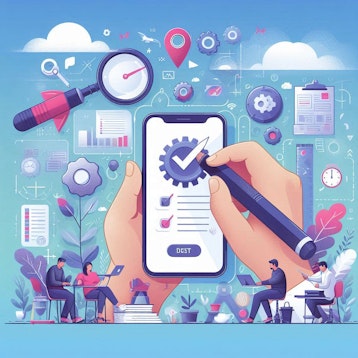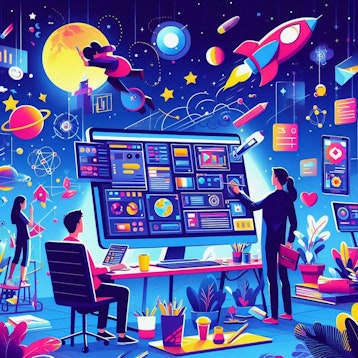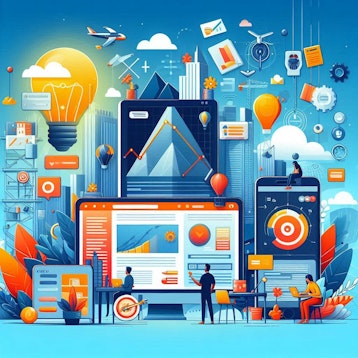Have you ever wondered how Artificial Intelligence (AI) is reshaping the business world and what its impact might look like in the future?
Undoubtedly, AI is an icon of change, revolutionizing how businesses operate, innovate, and interact with customers. We stand on the brink of an unprecedented digital dawn in which the integration of AI into business practices represents more than a trend.
The advent of AI marks a fundamental change towards more agile, intelligent, customer-centric models from automating mundane tasks to pioneering groundbreaking innovations. This increasingly employed technology is changing how business works today and will rewrite corporate horizons forever.
As we explore the meat of this article on the future of AI in Business, it's crucial to understand its transformative potential and its challenges. This new digital era promises to redefine how businesses operate, but are we ready for the changes it will bring?

How AI is Ushering in a New Era of Efficiency and Innovation
AI is ushering in a transformative era in business, marked by efficiency and innovation. Here's how:
Agility and Innovation: AI is revolutionizing business models, turning traditional approaches into agile operations that prioritize innovation and customer focus. This shift is essential in today’s digital-first world.
Research Insights: According to McKinsey & Company's Global AI Survey, AI has demonstrated its value across various industries, though scaling remains a challenge. The ability of AI to evolve business models to quickly adapt and meet changing market demands is critical.
Operational Efficiency: AI enhances operational efficiency by:
Automating Routine Tasks: It frees up employees to focus on strategic and creative tasks, thereby not only boosting productivity but also increasing job satisfaction by removing monotonous activities.
Enhancing Decision-Making: AI integrates seamlessly into business processes, enabling faster and more informed decision-making, thereby reducing the time from concept to execution.
Driving Innovation: Through tools like predictive analytics and machine learning, AI helps businesses:
Anticipate Trends: Companies can predict market trends and customer needs, staying ahead of the curve.
Customize Customer Interactions: As highlighted by Forbes, AI’s ability to analyze customer data allows for personalized marketing strategies, enhancing customer satisfaction and loyalty.
AI is not just transforming businesses; it's setting a new standard for how they operate, innovate, and engage with customers.
Operational Excellence in the Future of AI in Business Automation
Artificial intelligence (AI) is in many ways, profoundly transforming operational business excellence. Here are 5 indisputable ways this new technology is already reshaping the future of business operations:
Enhanced Efficiency and Productivity:
Task Automation: As highlighted in Harvard Business Review’s article How AI Is Changing Contracts, AI automates complex tasks, elevating efficiency and redefining productivity standards across industries.
Continuous Improvement: Automation allows businesses to surpass traditional operational limits, fostering higher levels of fluency and resilience.
Revolutionizing User Experience (UX) Design:
AI-Driven UX Optimization: Tools like the AI UX Design Review service, detailed at AI UX Design Review, utilize AI to evaluate and improve digital interfaces, ensuring they are user-friendly and meet evolving user expectations.
Data-Driven Decision Making:
Real-Time Analytics: AI processes vast data sets in real-time, enabling businesses to make informed decisions quickly, predict market trends, identify inefficiencies, and proactively adapt to changes.
Cultivating a Culture of Innovation:
Employee Empowerment: By automating mundane tasks, AI frees up staff to focus on strategic and creative tasks, enhancing job satisfaction and fostering a culture of innovation.
Attracting Top Talent: Organizations utilizing AI are more appealing to top-tier talent, who are drawn to companies at the cutting edge of technology.
Challenges and Considerations:
Change Management: Effective integration of AI into business operations requires robust change management strategies, emphasizing training and development to ensure employees can leverage new tools and technologies effectively.
By leveraging AI, businesses can achieve unprecedented operational excellence, adapting and thriving in an increasingly automated world.
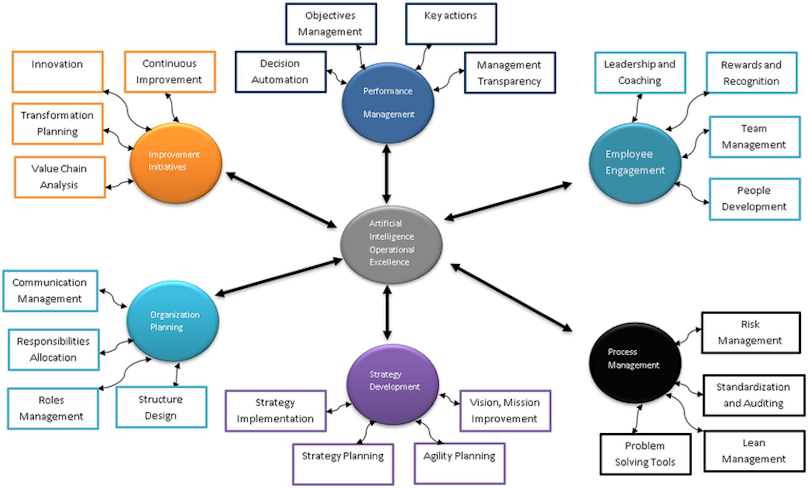
Customer Interactions in the Future of AI in Business
Keen observers have noticed how AI is dramatically altering customer interactions. By offering tailored experiences at scale, AI is setting new standards in customer engagement and satisfaction.
Forward-thinking businesses understand that customer service evolution is no mere option in today's digital era when consumer expectations have never been greater. An example of AI's power in this area can be seen through the creation and deployment of web applications that utilize AI technology, like SaaS AI-based web apps built by Adam Fard UX Studios.
Such apps demonstrate their effectiveness in providing more engaging, responsive, and personalized user experiences.
How AI is Revolutionizing Customer Interactions
AI's algorithms analyze customer data to provide tailored product or service recommendations that enhance both the shopping experience and the likelihood of purchase by showing customers exactly what is of most interest to them. Here are 5 common ways it does it:
24/7 Customer Support: AI-powered chatbots and virtual assistants provide customers with round-the-clock support, answering queries, solving problems, and processing transactions without human interaction.
Enhancing User Experience UX: AI tools used by AI UX Design Review services ensure websites and apps are designed for maximum usability, accessibility, and enjoyment for maximum customer satisfaction and loyalty.
Predictive Customer Service: Businesses can enhance customer satisfaction by anticipating customer issues and responding proactively. AI technology assists businesses in recognizing patterns that may signal potential problems or opportunities to delight the customer before they arise.
Feedback and Continuous Improvement: AI systems can analyze customer feedback across different channels to identify areas for enhancement, helping businesses continuously refine their products and services.
Fraud Detection and Security: AI-powered security measures help protect customer data while building trust by detecting and preventing fraudulent activities.
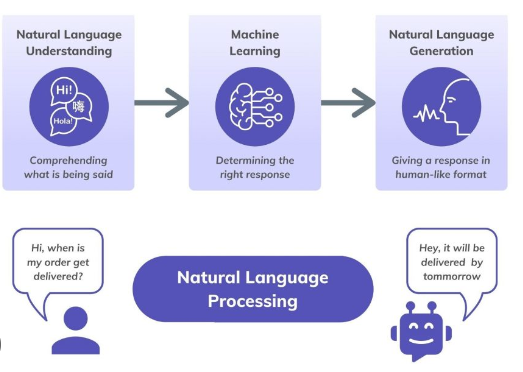
Future of AI in Sector-Specific Business
AI is increasingly changing industries by streamlining operations, improving customer experiences, and opening the way to breakthrough innovations. Its impact varies across sectors depending on its specific benefits or addressing individual challenges.
Let's examine how AI is transforming three major key sectors such as healthcare, fintech, and EdTech.
Healthcare: Revolutionizing Patient Care and Diagnostics
The impact of AI in healthcare is transformative, offering significant improvements in patient outcomes and operational efficiencies for providers.
Algorithms designed for medical image analysis outperform human capabilities, speeding up the diagnosis process and increasing precision. This advancement is especially crucial in early cancer detection.
By analyzing extensive patient data, these tools enable doctors to customize treatment plans more effectively, enhancing treatment efficacy and reducing side effects.
Furthermore, administrative tasks within healthcare settings are streamlined thanks to AI-powered tools. These innovations assist with patient scheduling and billing, freeing up healthcare professionals to concentrate on delivering top-notch care.
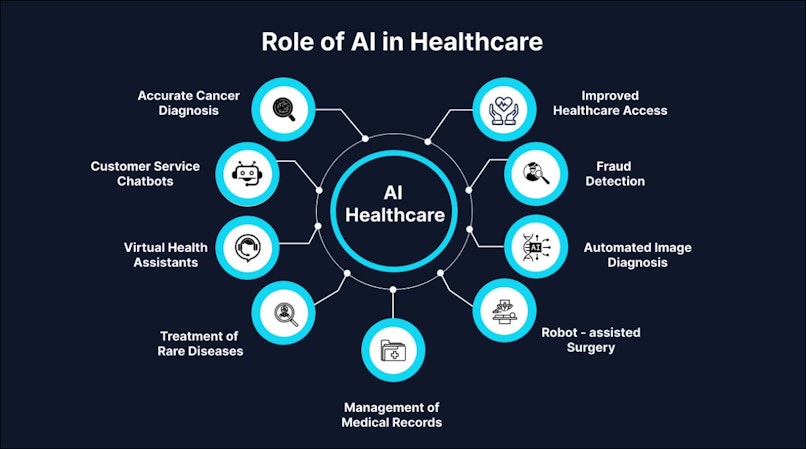
FinTech: Securing and Personalizing Financial Services
FinTech is leveraging AI to enhance security, improve customer experiences, and create innovative financial products and services. AI's role in analyzing transaction patterns helps prevent fraudulent activities, a point emphasized by MIT Technology Review in a discussion on AI for cybersecurity.
Robo-advisors powered by AI are transforming financial advising, offering personalized investment guidance based on individual financial statuses and goals. This democratizes access to financial advice, making it available to a broader audience.
Additionally, AI-equipped chatbots are enhancing customer service within FinTech. These bots provide 24/7 support, efficiently managing inquiries and transactions. This efficiency is a hallmark of the innovations seen in FinTech design, allowing for smoother and more effective customer interactions.
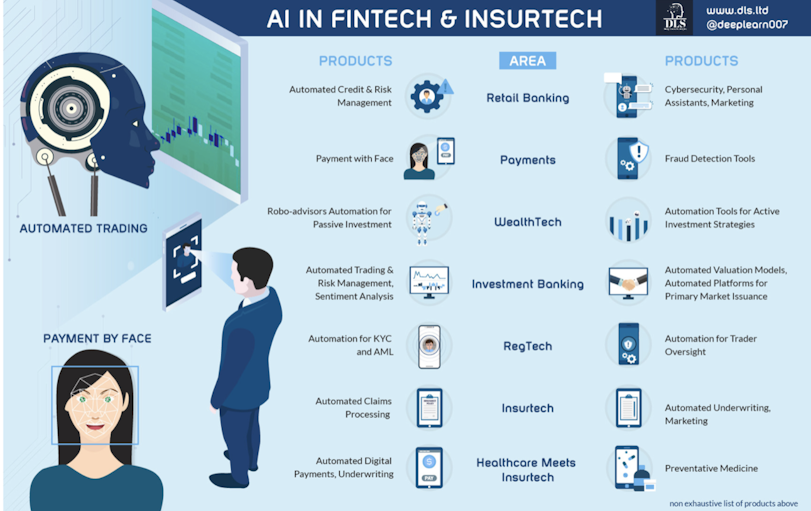
EdTech: Customizing Learning and Enhancing Efficiency
The integration of AI into educational technology is transforming how we learn, making education more engaging, personalized, and accessible. AI adapts educational content to fit each student's learning pace and style, focusing on their strengths and weaknesses for more effective learning.
Teachers are using AI to grade assignments and provide personalized feedback, saving time and enhancing the quality of instruction. AI-driven platforms offer students additional support by providing explanations, supplemental lessons, and practice exercises, as seen in innovative EdTech designs.
However, the implementation of AI in education faces challenges such as ethical concerns, data privacy, and the digital divide. To fully harness AI's potential, ongoing investment in training and development is crucial to prepare professionals to effectively use these technologies.
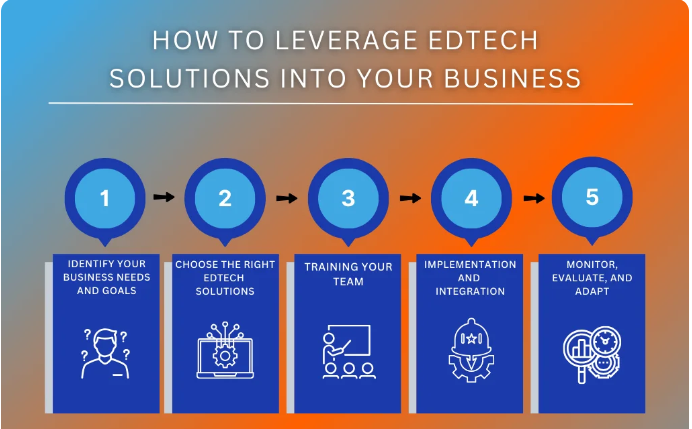
The Evolution of AI in the Future of the Workforce
The integration of AI into the business landscape is not only transforming operational models and customer experiences; it's fundamentally reshaping the workforce.
Far from the dystopian view that AI will render human jobs obsolete, the evolution of AI in the workplace is fostering a complementary relationship where technology enhances human capabilities, leading to more efficient, creative, and strategic roles.
Now let's examine some of the unprecedented shifts that are already taking place and that we can expect in the future of AI in business.
The Shift in Job Roles
The shift in job roles, with AI automating routine tasks, aligns with the World Economic Forum's The Future of Jobs Report 2020, emphasizing the liberation of employees to pursue more complex, creative, and strategic initiatives that add greater value to their organizations.
This shift demands a workforce that is adaptable, tech-savvy, and continuously learning, embodying a growth mindset to leverage AI tools effectively.
Enhanced Productivity and Innovation
AI's role in automating tasks extends beyond mere efficiency. It opens up new avenues for innovation, allowing companies to explore solutions and services that were previously unattainable due to resource constraints. Employees engaged in these innovative processes are likely to find their work more fulfilling and impactful.
New Employment Opportunities
As AI creates new sectors and services, it also generates demand for new job roles. AI specialists, data scientists, and ethical AI advisors are just a few examples of careers that have emerged directly from the AI revolution. Furthermore, AI's application across various industries means that this demand spans sectors, from healthcare to finance and education.
The Challenge of Re-skilling
One of the major challenges facing businesses and employees alike is the need for reskilling and upskilling. As AI continues to evolve, so too does the demand for new skills. Organizations must invest in continuous learning and development programs to ensure their workforce can harness AI's potential fully.
In this past article, Will AI Replace UX Designers? we explored these themes, highlighting the need for a symbiotic relationship between AI advancements and human skill development.
Ethical Considerations and AI Governance
The deployment of AI in the workplace also brings forth ethical considerations, including privacy, surveillance, and bias. Establishing clear governance around AI use, ensuring transparency in AI-driven decisions, and fostering an ethical AI culture are critical components of successfully integrating AI into the workforce.
Overcoming Challenges in AI Adoption
Integration of AI into business processes provides many transformative advantages, from operational efficiencies to customer experiences tailored to each customer.
Unfortunately, however, full AI adoption is fraught with difficulties that range from technical and financial constraints to ethical dilemmas and workforce adaptation issues.
Successfully navigating these obstacles requires strategic planning, stakeholder engagement, and an unwavering dedication to continual learning and improvement.
Technical Complexity and Integration:
One of the primary obstacles to AI adoption is its complex integration into existing technological infrastructures. Businesses frequently experience difficulty when trying to deploy AI solutions compatible with their current systems, necessitating upgrades or complete overhauls to integrate AI correctly. The integration process itself demands extensive technical expertise as well as substantial upfront costs.
Data Privacy and Security Concerns:
AI systems rely heavily on data to function, prompting businesses to ensure that their AI applications adhere to data protection regulations and ethical standards, safeguarding customer information against breaches or misuse. Balancing AI-powered insights with protecting sensitive data presents businesses with an ongoing challenge.
Ethical Implications:
AI's ethical use has become an increasing source of concern, raising issues like bias in AI algorithms and perpetuating existing inequalities. Companies must implement AI systems ethically and transparently so as not to perpetuate existing disparities or inequalities. Companies are charged with creating AI solutions in such a manner as to ensure decisions made are in an unbiased manner by AI systems.
Workforce Transformation:
AI adoption can require significant workforce transformation. This transition usually includes upskilling employees to work alongside AI technologies, alleviating any fears of job displacement, and creating a culture that embraces digital innovation.
As discussed in this past article AI UX Research Trend, businesses increasingly look for insights into user experiences with AI to inform adoption decisions - emphasizing the need for human-centric approaches when adopting artificial intelligence technologies.
Overcoming Resistance to Change:
Human beings naturally resist change, and AI implementation is no exception. Businesses must manage this effectively by communicating the benefits of AI to all relevant parties involved and including them in its transition process - offering training, and support, and showing how it enhances rather than replaces their roles.
Engaging AI ethics boards or consulting experts to navigate ethical considerations.implementing pilot projects to demonstrate AI's value and gather stakeholder feedback.
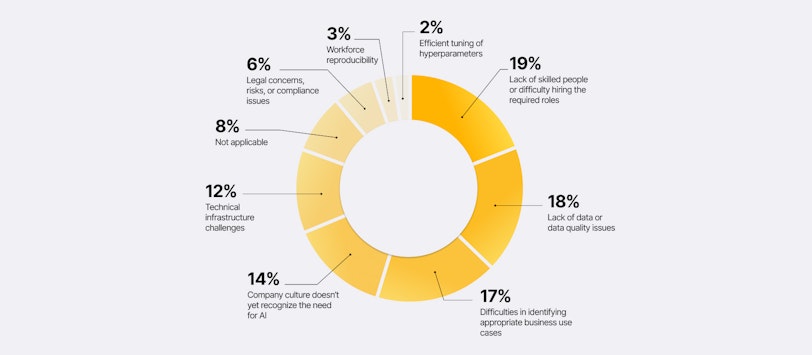
Conclusion: Leveraging AI to Prepare for Tomorrow
AI is profoundly transforming industries and reshaping business operations and workforce dynamics. Far from being just a futuristic concept, AI has become a critical element for growth, innovation, and competitiveness. Its integration into daily operations not only offers opportunities but also demands strategic adaptation to ensure businesses remain customer-centric and operationally intelligent.
As AI becomes increasingly integral to business success, it necessitates a shift in organizational culture towards continuous learning, ethical practices, and human-centric approaches. The tangible benefits of AI, such as enhanced operational efficiency, improved customer experiences, and the creation of new markets, make a compelling case for its adoption.
Businesses poised for success are those that view AI not merely as a tool for automation but as a driver of innovation and transformation. Looking ahead, these businesses will need to leverage AI's current benefits while also preparing for its long-term impact on industries, society, and the global economy, ensuring more efficient and innovative operations moving forward.


